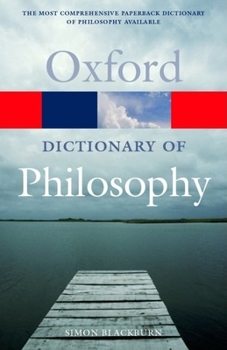The Oxford Dictionary of Philosophy
Select Format
Select Condition 
Book Overview
The Gambler's Fallacy, the Dirty Hands Argument, Pascal's Wager, Buridan's Ass, Wittgenstein's Beetle in the Box--philosophical terms can be both intriguing and baffling. Now, eminent philosopher Simon Blackburn offers the most authoritative and up-to-date dictionary of philosophy available in a single volume, packed with helpful information for the novice and with astute observations for the expert. Ranging from Aristotle to Zen, the two thousand...
Format:Paperback
Language:English
ISBN:0192831348
ISBN13:9780192831347
Release Date:May 1996
Publisher:Oxford University Press, USA
Length:428 Pages
Weight:0.71 lbs.
Dimensions:0.9" x 7.7" x 5.1"
Customer Reviews
5 ratings
Surprisingly Comprehensive, Brilliant Encapsulations
Published by Thriftbooks.com User , 18 years ago
I have long referred to the original Oxford Dictionary of Philosophy (1994) by Simon Blackburn. At that time, it was almost unique as a one-volume dictionary of philosophy. Especially in more recent years, however, it sometimes seemed to come short. Some crucial entries were missing, e.g. deflationary theories of truth, forms of life, or motivation -- and in particular, postmodern philosophers and postmodern terms. This has all been addressed eleven years later, so that the 2005/2006 editions do not disappoint. It is surprisingly comprehensive, and it brilliantly encapsulates the core meaning of each entry in readily understandable terms. More obscure entries are cross-referenced to other terms, e.g. axiology, ideal language, or retributive justice. Blackburn states in his preface that he has sought chiefly to write "through my own interests and judgements", keeping "the likely needs of the user in mind" -- while at the same time seeking to "light up the faculties". I would consider that the end result is a very good mix. One might well find all that one needs in this single volume. This having been said, Blackburn is not known for his affection for postmodernism. Combined with his own special form of panache, this makes the new edition of the Oxford Dictionary of Philosophy a humorous read at times. Foucault, he notes, is said to deal with "subject and abject"; Derrida, on being accused of "a tissue of confusions", responded with a "blizzard of text"; while Levinas is "perhaps beyond the limits of intelligibility". I found myself following the postmodern trail just to find the next joke.
Grateful Help For the Novice
Published by Thriftbooks.com User , 19 years ago
I try to read Philosophy, I really do. It just seems to have a sedative effect on me. I frequently read science books that have significant amounts of Philosophy scattered about. I keep this book right by my side. As opposed to the Oxford Dictionary of Science, this book almost always includes the entry I'm looking for. Since it's common in definitions about philosophy to refer to other terms in philosophy, when the second term is also defined in this book, an asterisk is placed on it. This is quite helpful since I frequently want additional clarification - I'll look up the other word also. Simon Blackburn writes in a nice style and this book has been exactly the ticket for my needs.
Delightful
Published by Thriftbooks.com User , 21 years ago
Professor Blackburn has written a concise, clear, and witty dictionary of philosophical and political terms covering a wide array of traditions, both Eastern and Western. And like all the best reference works, it carries the flavor of an individual author, displaying, here and there, touches of idiosyncratic wit and charm. Many of Blackburn's definitions are masterpieces of concision and fairness--see, for instance, his entry on Nietzsche, which squeezes a century's worth of scholarship into two-and-a-half lucid columns. This delightful book has earned a permanent place on my desktop.
Near Perfect Entry Level Dictionary of Philosophy
Published by Thriftbooks.com User , 22 years ago
Philosophy is, at best, a difficult business. Whether one is a professional philosopher (whatever that means), or a casual reader, any discussion of philosophy requires familiarity with a huge number of specialized terms. A philosophical dictionary allows the reader to quickly ground himself in the vocabulary without losing the train of thought.The various encyclopedias of philosophy are more comprehensive, but they serve a completely different purpose. If you are looking for in depth analysis, turn to an encyclopedia, but for a quick definition, this volume is perfect. The entries contain just the perfect amount of information. You are quickly gotten up to speed, without bogging down in endless peripheral issues.In short, a valuable supplement to philosophical studies, both for the novice and for the more experienced reader of philosophical texts.
A very useful dictionary for the general reader
Published by Thriftbooks.com User , 24 years ago
Apparently Blackburn's purpose is to provide a dictionary that is helpful to the novice and general reader, and his dictionary admirably succeeds in making the language of philosophy accessible. Although the graduate student and the professional will probably not find the book to be especially useful, much good can come from bringing philosophy to the non-specialist. Oxford University Press should be commended for adding this title to the many books it has published in an effort to bring knowledge to the novice and general reader. Because Blackburn's dictionary meets its objective, this one gets five stars.






